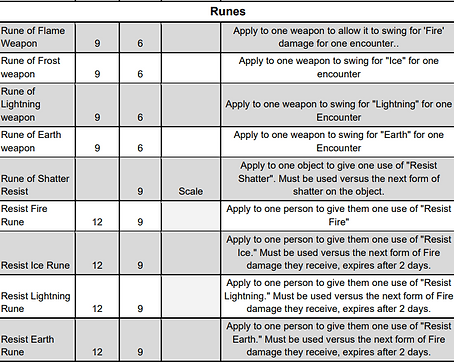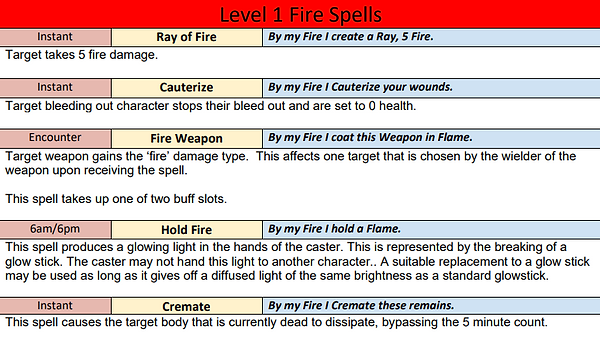

Skills
Magoria is a skill based game. Skills are purchased with Experience Points (XP) which are automatically accumulated as a character attends events. Skills allow a character to perform specific actions or tasks within the game world. Some skills are able to be used at will, while others may require certain conditions met before they are able to be used again. Most skills may only be purchased a single time, those skills that are purchasable multiple times will specifically say so in their description.
Learning Skills
Skills are representations of time spent practicing and mastering a particular skill, craft, or discipline. Because Magoria is a skill based game it is important to note that a player’s personal skill may not equate to what their character is actually capable of doing. For instance whether the player is capable of wielding an axe proficiently or not outside of the game, their character must have the One Handed skill before they are able to use one in the game.
Characters gain XP at a rate of 8 XP per event. Characters can earn an additional 2 XP for pre-registration. Characters also earn an additional 2 XP for completing an event commentary within 2 weeks of an event ending for a maximum of 12 XP per game.
A character in Magoria will begin with 80 XP, properly pre-registered characters will begin with 88 XP; this includes pre-registering for your first event and submitting a background for your character before your first event. A character can start the game with any of the skills on the “Starting and Basic Skills” chart. In between games, players may spend their XP on any of the skills on the “Starting and Basic Skills” chart that are not highlighted in yellow.
Crafting Skills


In Magoria, Players can choose to undertake crafting skills. These range from Smithing, Artificing, and Runecrafting. Each one has its own set of items available to make, use, or trade to other players.
Forge
A Forge assists in the creation process of an item. Without a forge a single crafted item could take hours, day, or even weeks to complete, a Forge provides magical assistance to hasten this process into just a few minutes. A Forge also is able to provide the most common crafting components in exchange for money, this is how the average smith or alchemist is able to go to a Forge without an armload of metal or vials and walk away with weapons and salves. Manipulating a Forge in these ways is taxing on the crafter, limiting the output of any individual crafter, this is represented by the crafting Ranks.
Expiration Dates
Jonin crafts a sword during an event. He is able to use it the remainder of this event. The next two events he is still able to use the sword. The third event Jonin is still able to use the sword the first night of the event, but when he wakes up the next morning the sword will have expired and will no longer be usable. Any expired item may be repaired for the same Rank, monetary, and component cost of creating the same item. This allows a character, from a role play standpoint, to claim they have had the same item when the item has expired. For instance if a character wants to use their grandfather’s sword they can have the expired tag repaired rather than getting a new sword when they get a new tag.
Components
Components are the ingredients of crafted items. There are 4 tiers of crafting components. Tier 1 items decrease the cost of a crafted item by 2 silver each, and you may use multiple Tier 1 components during a craft for additional reduction. Tier 2-4 components serve as a required component for crafting of advanced items, and may not be used in this manner. All crafters will be given an identification chart so that they can identify what a specific component is. In order to use a tier 1 component for a cost reduction, it needs to be on your component identification chart for that specific craft. For example, bits of metal cannot be used to reduce the cost of creating a scroll.
Important Crafting Notes
Each form of crafting is unique in both their craftable items and crafting related abilities. These terms and rules will apply to all craftspeople and their respective trade. Crafting skills will be learned the same way that other skills and magic are. Each rank will cost experience points to learn more advanced techniques and to be able to craft more items per day.
Learnable Trades
Rune Crafting allows the crafter to create items that are inherently magical. They manipulate the mana around them much like a caster would while casting a spell. Rune Smiths also create Focus and Wands, which are required to manipulate mana in such a way as to cast spells of 3rd level or higher.
Smithing is the form that the weapons and armors used against the tide of evil come from. Smiths are able to take raw ores and smelt them into a refined metal that is then used to create everything from maces, to pole arms, to shields, and armors. Without Smiths the world would not be able to survive. All items made with smithing are destroyed after 3 events. Smiths may change this with enhancements.
Artificers utilize no magic in their craft and are able to take mundane items and turn them into items that can turn the tide of battle, save the life of an innocent or allow players to make more... Nefarious items.




Spells
Magoria offers many different ways to cast spells. Whether you want to heal/buff allies, or damage/debuff enemies, Magoria has what your looking for!
Magic Terms
Mana Regeneration
In order to regain their spent mana a player must spend time meditating at specific locations. These locations go by many names: Mana Wells, Mana Reset Junctures, Fountains of Mana, etc. They must meditate for five minutes and sacrifice components to the location to regain their mana. A character regains 3 mana per 1 tier of components expended. A character may expend any number of components this way, but their mana total may not exceed their maximum mana. A character may perform this ritual one time per weekend unless they have an item or additional ritual that lets them do otherwise. Any character can recognize a mana reset component by the slight vibrations they feel when they are held
Magic Focus
As spells increase in complexity, they require more of the caster's attention. Unaided, a caster would have to sit in total isolation for an extended period before they could successfully cast a complex spell. Otherwise the distractions of their surrounding environment would ruin their concentration and the spell would be lost. To solve this problem, the early practitioners of magic developed magical foci. A focus is a specially prepared object that the caster attunes to. This preparation is Runic in nature, and the magical alteration to the object's essence must be refreshed periodically. Once attuned, the focus acts as an anchor for the caster’s concentration. Whenever they have the focus in hand, they are able to immediately gain the level of concentration required for manipulating more difficult magics without the need for silence and intense meditation. A focus can take any number of forms, but they generally need to be some sort of handheld object. Some practitioners of magic hang their focus on amulets, others attach them to their belts. Some prefer wands, others prefer orbs, others still like books, and some have a weapon prepared as a focus.
Buffs
Characters are able to have up to two buffs on them at a time. Spells that count towards this limit state this in their description. If a character has two buffs on them already and someone attempts to place a third buff on them then the third spell fizzles and has no effect. Most buffs will automatically be removed from the recipient if not used by the next 6 o’clock (6 AM or 6PM whichever comes first).
Sample Spell Tables









